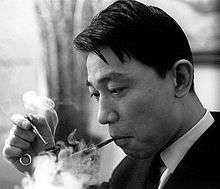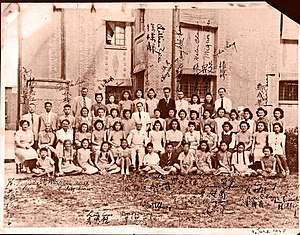Fou Ts'ong
Fou Ts'ong or Fu Cong (Chinese: 傅聰; pinyin: Fù Cōng; born 10 March 1934) is a Chinese pianist.

Life and career

Born in Shanghai, to a family of intellectuals (his father was the translator Fu Lei), Fou first studied piano with Mario Paci, the Italian founder of the Shanghai Symphony Orchestra. In 1953, Fou moved to Europe to continue his training at the State Higher School of Music in Warsaw (at present Fryderyk Chopin University of Music in Warsaw) with Zbigniew Drzewiecki, where he impressed his professors with his grasp of the mazurka rhythm. His mastery was confirmed when he won 3rd prize and the special Mazurka Prize at the 1955 International Chopin Piano Competition.
Fou has been based in London since 1958, whence he embarked on a performing and teaching career that has taken him throughout the world and been acclaimed for his interpretations of Chopin. Hermann Hesse proclaimed him to be the only true performer of the composer's work. Among Fou's friends are the fellow pianists Martha Argerich, Leon Fleisher and Radu Lupu, who, acknowledging his influence upon their musical development, were "obliged to Fou Ts'ong for all his new ideas and for opening new musical horizons for all of us."
He was a member of the Queen Elisabeth Music Competition's jury in 1991, 1999 and 2007.
From 1960 to 1969, he was married to Zamira Menuhin, the daughter of Yehudi Menuhin, and they had one son. Their marriage ended in divorce.[1] He later married the Chinese pianist Patsy Toh. He lives in London.
Fou's parents Fu Lei and Zhu Meifu were persecuted during the Cultural Revolution and committed suicide in September 1966. Fou Ts'ong has a brother named Fu Min.[2]
References
- Fou Ts'ong. The Peerage. Retrieved on 2015-07-04.
- 傅雷夫婦“葉落歸根”骨灰落葬浦東 傅敏致辭 Archived 2013-10-29 at the Wayback Machine. Sh.eastday.com (2013-10-28). Retrieved on 2015-07-04.
External links
| Wikimedia Commons has media related to Fou Ts'ong. |